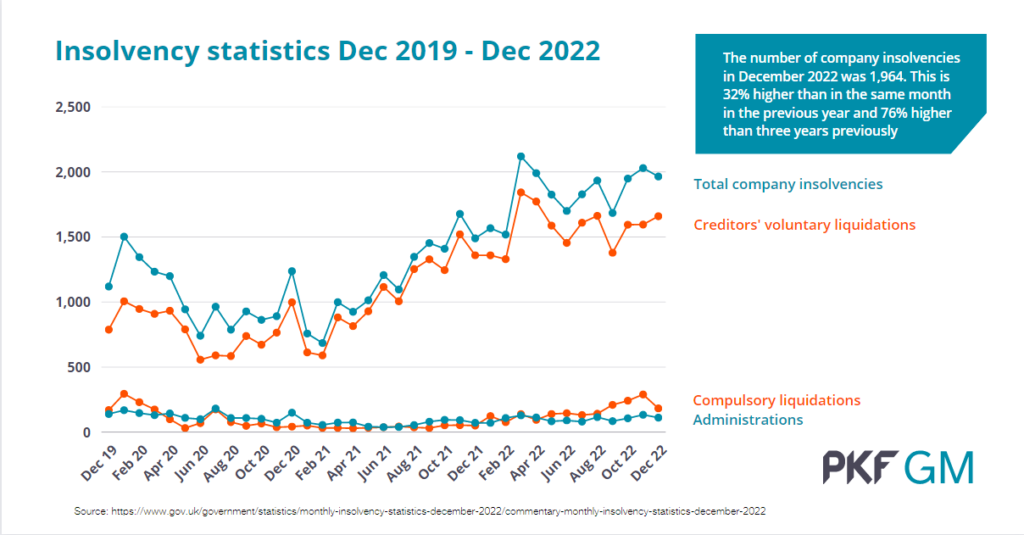Headwinds are likely to cause issues even for better-performing businesses in 2023. Directors are advised to act now as economic climate drives increase in insolvencies. PKF GM launch training webinar series to support company directors understand the insolvency process.
Corporate Insolvencies surge
Insolvency figures released today for December 2022 by the Government’s Insolvency Service show that the number of registered company insolvencies in December 2022 was 1,964. This is 32% higher than in the same month in the previous year (1,489 in December 2021), and 76% higher than the number registered three years previously (pre-pandemic; 1,119 in December 2019).
In December 2022 there were 1,659 Creditors’ Voluntary Liquidations (CVLs), 22% higher than in December 2021 and more than twice as many as December 2019.
Leading restructuring and insolvency professional Oliver Collinge from PKF GM said:
“The large rise in corporate insolvency numbers is not surprising compared to this time last year. But a material increase on pre-pandemic levels, as we are seeing now, is concerning. Unfortunately I think this is the start, not the peak, of rising insolvencies. ”
It is also can also be challenging for firms to build prepare reliable forecasts at this stage, given the current economic uncertainties, and this can this in turn makes raising obtaining additional liquidity or capital more challenging. Speaking to an expert to discuss the options available is key.”
Tough 2023 ahead as cash flow pressure on businesses grows and even better-performing businesses won’t be immune
Oliver continued:
“We’re seeing the current headwinds creating challenges even for some better-performing businesses, not only those that were already in survival mode. Businesses in the hospitality and retail sectors are particularly at risk. The cost-of-living crisis has led to the biggest fall in real pay on record and the price of energy remains high. Pressure on cash continues, and unfortunately, we expect to see heightened levels of business failures for some time to come.”
Training to support company directors as they’re urged to act now

PKF GM are running a series of webinars to guide company directors through the insolvency process, directors’ duties and how to avoid personal risk.
“For many directors, this is the first recession they’ve worked through. We’ve designed this training to help them to identify warning signs, understand when to call the experts in and lead their companies through what is undoubtedly going to be a tough 2023.
“We’re advising directors and their advisors to act now as the worsening macro-economic climate is likely to result in severe cash flow pressure. It’s critical businesses act early and seek advice if they are struggling now or think cash flow may be squeezed in the coming months. The earlier they act, the more options they’ll have to secure the business’s long-term survival.
“Having a restructuring professional guide you through the process can be invaluable in getting the best outcome and will also help you understand and mitigate your risk as a director.”
“For struggling businesses, it’s not too late to begin negotiations with landlords and creditors to develop manageable repayment plans. Will revenues be high enough to support your cost base? Will cash flows be sufficient to deal with the additional debt burden (both formal and informal) that has accrued during Covid? Perhaps a CVA is something which should be considered or, where you may need to take the difficult decision to make redundancies to survive, consider applying for government funding to meet the short-term cash impact of this.”
Of the 1,964 registered company insolvencies in December 2022:
There were 1,659 CVLs, which is 22% higher than in December 2021 and 111% (2.1 times) higher than in December 2019;
183 were compulsory liquidations, which is 259% (3.6 times) higher than December 2021 and 8% higher than December 2019;
10 were CVAs, which is 43% higher than December 2021 but 52% lower than December 2019;
There were 112 administrations, which is 56% higher than December 2021 but 20% lower than December 2019; There were no receivership appointments.





